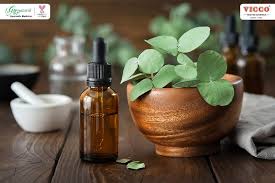
Eucalyptus Oil in Skin Care
Eucalyptus oil (Eucalyptus Globulus) is a popular essential oil in many fragrances and skin care products.
It is toxic when ingested orally, but is considered non-toxic (clean) in skin care.
Eucalyptus oil is known for its profound anti-inflammatory, antioxidant, hydrating, and antimicrobial abilities.
Read below to get all the facts on eucalyptus oil, and find out why it is not considered the best for every skin type.
To find out if eucalyptus oil is a good fit for your custom skin care regimen, take our quiz and shop by your Baumann Skin Type!
What kind of oil is eucalyptus oil?
Eucalyptus oil is considered a plant based essential oil.
Eucalyptus oil does not contain any fatty acids or other lipids, so it is not a true oil.
The oil is thin, spreadable, and contains many antioxidant, anti-inflammatory, and even moisturizing properties.
Because it is thin and does not contain fatty acids, it is not considered a dry oil or a carrier oil.
What are the active compounds?
The primary active compound in eucalyptus oil is the monoterpene a-pinene, a potent anti-inflammatory compound. (1)
The essential oil also has a notable presence of eucalyptol (8-cinelol), followed by various other terpenes, aldehydes, and ketones all with their own properties.
Aldehydes and ketones are generally antimicrobial compounds, just as they are in eucalyptus oil.
There are dozens of compounds present and active in eucalyptus oil; one study measured 63 distinct active chemical compounds. (3)
Eucalyptus oil is considered to have an extremely low content of fatty acids or other lipids, meaning it is not a true oil in a technical sense.
Benefits of eucalyptus oil
Benefits
Eucalyptus oil has long been used in skin care for its potent antimicrobial, antioxidant, and anti-inflammatory effects. (1,3,4)
It is often considered among the most potent natural antimicrobial ingredients in skin care.
Topical application assists in the production of ceramides on the skin which moisturize the skin and assist in reducing TEWL.
The antioxidants present in the oil make it a compelling candidate for anti-aging products and regimens.
It is most commonly found in hygienic products and contributes to shelf stability by preventing oxidation and microbial growth.
Here are some of my favorite skin care products with eucalyptus:
slide 5 to 7 of 3
Viviscal Professional Hair Conditioner 250 ml Viviscal Professional Thin to Thick Conditioner – Skin Type Solutions
Viviscal Professional Thin to Thick Conditioner
₫
693,000
See Product
Viviscal Professional Shampoo 250 ml Viviscal Professional Thin to Thick Shampoo – Skin Type Solutions
Viviscal Professional Thin to Thick Shampoo
₫
693,000
See Product
Viviscal Professional Scalp Treatment Viviscal Professional Thin to Thick Elixir – Skin Type Solutions
Viviscal Professional Thin to Thick Elixir
₫
970,000
See Product
Side-effects
There are a few notable dangers and side-effects associated with eucalyptus oil that should be considered before applying to your skin.
If you have rosacea, eucalyptus oil is considered one of the paramount oils to avoid.
Many people find eucalyptus oil irritating to the skin, it commonly results in stinging on applied areas.
It is considered extremely toxic when consumed orally, so please do not taste test your eucalyptus products.
Fortunately, toxicity associated with eucalyptus consumption only appears to have temporary effects in humans. (2)
It is common to have an allergy to eucalyptus oil. (8)
Is it safe?
Eucalyptus oil is considered safe and non-toxic when used in topical applications, like in skin care products. (4)
EWG rating is “4-6 depending on usage” which means it is not considered a particularly safe ingredient in certain situations.
The main reason for this low score is because it is toxic when ingested orally and has a fairly high chance of causing allergies.
If you are not allergic to eucalyptus and do not plan on eating it, it can be safe for use as a part of your skin care routine.
Is eucalyptus oil safe?
Uses
Because eucalyptus contains so many antimicrobial and antioxidant properties, it is commonly found in hygiene related skin care products such as:
Acne cleansers
Conditioners
Fragrances
Hair growth products
Shampoos
For hair
The moisturizing, anti-inflammatory, and antioxidant properties of eucalyptus oil make it a popular and good choice for hair care.
Studies have found compelling evidence that eucalyptus oil is good at hydrating and repairing the scalp and hair follicles. (7)
You can find eucalyptus oil in products designed to stimulate hair growth and thickening such as Viviscal’s thin to thick elixir.
When used alongside ingredients with other benefits to hair like UV protection or barrier repair function, eucalyptus oil is considered very good for many types of hair and scalps.
slide 5 to 7 of 3
Viviscal Professional Hair Conditioner 250 ml Viviscal Professional Thin to Thick Conditioner – Skin Type Solutions
Viviscal Professional Thin to Thick Conditioner
₫
693,000
See Product
Viviscal Professional Scalp Treatment Viviscal Professional Thin to Thick Elixir – Skin Type Solutions
Viviscal Professional Thin to Thick Elixir
₫
970,000
See Product
Viviscal Professional Shampoo 250 ml Viviscal Professional Thin to Thick Shampoo – Skin Type Solutions
Viviscal Professional Thin to Thick Shampoo
₫
693,000
See Product
For acne
Eucalyptus oil contains potent antimicrobial components which make it useful in treatments of acne. (6)
Acne is caused by specific bacteria building up in clogged pores on the skin, so eliminating that bacteria is key to preventing acne.
In addition, eucalyptus oil is non-comedogenic, which means it does not itself clog pores or add oil to the face.
For dry skin
Eucalyptus oil might be good for the treatment of specific dry skin concerns, but it is probably not the best for extremely dry skin types as there are other oils with a higher amount of fatty acids that are more hydrating to the skin than this oil.
That being said, other studies have stated that eucalyptus extract can increase ceramides in human skin and improve the water holding capacity of the outermost layer of skin (the stratum corneum). (5)
Whether or not eucalyptus oil is right to include in your dry skin care routine depends on the severity of your skin’s dryness and your particular skin concerns.
Take our skin type quiz to see if eucalyptus products are the best choice for you!
Take the Quiz
For sensitive skin
Unless you have rosacea, skin stinging, or an allergy to this ingredient, it can be used in sensitive skin types.
It is a good anti-inflammatory ingredient, rich in soothing compounds. (4)
For hyperpigmentation
Eucalyptus has tyrosinase inhibiting properties, meaning it can be used in the treatment of various kinds of hyperpigmentation. (4)
The active compounds in eucalyptus oil were found to directly interfere with melanin production in skin, which means it could be a good ingredient in products designed for melasma or PIH.
The best treatments for dark spots include multiple active ingredients, so eucalyptus oil is most effective as a skin lightener in combination with others like:
Cysteamine
Ferulic acid
Licorice extract
Resorcinol
Eucalyptus oil for wrinkles
For wrinkles
Eucalyptus oils have expressed anti-aging effects in multiple studies (4) and are effective at eliminating free radicals on the skin.
Anti-aging treatments work by binding and removing oxidized radical ions from the skin which can cause genetic damage and wrinkles.
There are many kinds of anti-aging ingredients, and eucalyptus oil can be used alongside many of them.
Anti-aging regimens take a long time and have limited effects, so don’t expect applying eucalyptus oil daily to remove 15 years in two weeks.
Anti-aging regimens can take a long time to work, so the best way to treat wrinkles is to get ahead of them with preventative treatments.


